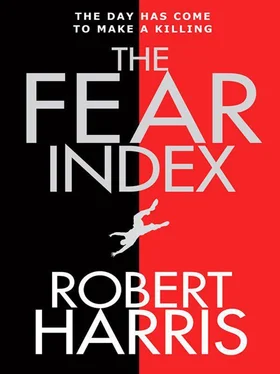Robert Harris - The Fear Index
Здесь есть возможность читать онлайн «Robert Harris - The Fear Index» весь текст электронной книги совершенно бесплатно (целиком полную версию без сокращений). В некоторых случаях можно слушать аудио, скачать через торрент в формате fb2 и присутствует краткое содержание. Жанр: Триллер, на английском языке. Описание произведения, (предисловие) а так же отзывы посетителей доступны на портале библиотеки ЛибКат.
- Название:The Fear Index
- Автор:
- Жанр:
- Год:неизвестен
- ISBN:нет данных
- Рейтинг книги:4 / 5. Голосов: 1
-
Избранное:Добавить в избранное
- Отзывы:
-
Ваша оценка:
- 80
- 1
- 2
- 3
- 4
- 5
The Fear Index: краткое содержание, описание и аннотация
Предлагаем к чтению аннотацию, описание, краткое содержание или предисловие (зависит от того, что написал сам автор книги «The Fear Index»). Если вы не нашли необходимую информацию о книге — напишите в комментариях, мы постараемся отыскать её.
The Fear Index — читать онлайн бесплатно полную книгу (весь текст) целиком
Ниже представлен текст книги, разбитый по страницам. Система сохранения места последней прочитанной страницы, позволяет с удобством читать онлайн бесплатно книгу «The Fear Index», без необходимости каждый раз заново искать на чём Вы остановились. Поставьте закладку, и сможете в любой момент перейти на страницу, на которой закончили чтение.
Интервал:
Закладка:
Hoffmann held the volume to his nose and inhaled. A compound of leather and library dust and cigar smoke, so sharp he could taste it, with a faint hint of something chemical – formaldehyde, perhaps, or coal-gas. It put him in mind of a nineteenth-century laboratory or lecture theatre, and for an instant he saw Bunsen burners on wooden benches, flasks of acid and the skeleton of an ape. He reinserted the bookseller’s slip to mark the page and carefully closed the book. Then he carried it over to the shelves and with two fingers gently made room for it between a first edition of On the Origin of Species, which he had bought at auction at Sotheby’s in New York for $125,000, and a leather-bound copy of The Descent of Man that had once belonged to T. H. Huxley.
Later, he would try to remember the exact sequence of what he did next. He consulted the Bloomberg terminal on his desk for the final prices in the USA: the Dow Jones, the S amp;P 500 and the NASDAQ had all ended down. He had an email exchange with Susumu Takahashi, the duty dealer in charge of execution on VIXAL-4 overnight, who reported that everything was functioning smoothly, and reminded him that the Tokyo Stock Exchange would reopen in less than two hours’ time following the annual three-day Golden Week holiday. It would certainly open down, to catch up with what had been a week of falling prices in Europe and the US. And there was one other thing: VIXAL was proposing to short another three million shares in Procter amp; Gamble at $62 a share, which would bring their overall position up to six million – a big trade: would Hoffmann approve it? Hoffmann emailed ‘OK’, threw away his unfinished cigar, put a fine-meshed metal guard in front of the fireplace and switched off the study lights. In the hall he checked to see that the front door was locked and then set the burglar alarm with its four-digit code: 1729. (The numerals came from an exchange between the mathematicians G. H. Hardy and S. I. Ramanujan in 1920, when Hardy went in a taxi cab with that number to visit his dying colleague in hospital and complained it was ‘a rather dull number’, to which Ramanujan responded: ‘No, Hardy! No, Hardy! It is a very interesting number. It is the smallest number expressible as the sum of two cubes in two different ways.’) He left just one lamp lit downstairs – of that he was sure – then climbed the curved white marble staircase to the bathroom. He took off his spectacles, undressed, washed, brushed his teeth and put on a pair of blue silk pyjamas. He set the alarm on his mobile for six thirty, registering as he did so that the time was then twenty past twelve.
In the bedroom he was surprised to find Gabrielle still awake, lying on her back on the counterpane in a black silk kimono. A scented candle flickered on the dressing table; otherwise the room was in darkness. Her hands were clasped behind her head, her elbows sharply pointed away from her, her legs crossed at the knee. One slim white foot, the toenails painted dark red, was making impatient circles in the fragrant air.
‘Oh God,’ he said. ‘I’d forgotten the date.’
‘Don’t worry.’ She untied her belt and parted the silk, then held out her arms to him. ‘I never forget it.’
IT MUST HAVE been about three fifty in the morning that something caused Hoffmann to wake. He struggled up from the depths of sleep and opened his eyes to behold a celestial vision of fiery white light. It was geometrically formed, like a graph, with thinly spaced horizontal lines and wide-apart vertical columns, but with no data plotted – a mathematician’s dream, but not in fact a dream, he realised after squinting at it for a few seconds; rather the result of eight five-hundred-watt tungsten-halogen security lights shining brilliantly through the slats of the window blinds – enough wattage to light a small soccer ground; he had been meaning to have them changed.
The lights were on a thirty-second timer. As he waited for them to turn off, he considered what might have interrupted the infrared beams that criss-crossed the garden to trigger them. It would be a cat, he thought, or a fox, or a piece of overgrown foliage waving in the wind. And after a few seconds the lights were indeed doused and the room returned to darkness.
But now Hoffmann was wide awake. He reached for his mobile. It was one of a batch specially produced for the hedge fund that could encrypt certain sensitive phone calls and emails. To avoid disturbing Gabrielle – she detested this habit of his even more than she hated him smoking – he switched it on under the duvet and briefly checked the Profit amp; Loss screen for Far Eastern trading. In Tokyo, Singapore and Sydney the markets were, as predicted, falling but VIXAL-4 was already up 0.3 per cent, which meant by his calculations that he had made almost $3 million since going to bed. Satisfied, he turned off the device and replaced it on the nightstand, and that was when he heard a noise: soft, unidentifiable, and yet oddly disturbing, as if someone was moving around downstairs.
Staring at the tiny red dot of light of the smoke detector fixed to the ceiling, he extended his hand cautiously beneath the duvet towards Gabrielle. Lately, after they had made love, if she couldn’t sleep, she had got into the habit of going down to her studio to work. His palm traversed the warm undulations of the mattress until his fingertips brushed the skin of her hip. Immediately she muttered something unintelligible and rolled her back to him, pulling the duvet tighter around her shoulders.
The noise came again. He raised himself on his elbows and strained his ears. It was nothing specific – an occasional faint thump. It could just be the unfamiliar heating system, or a door caught in a draught. At this stage he felt quite calm. The house had formidable security, which was one of the reasons he had bought it a few weeks earlier: apart from the floodlights, there was a three-metre-high perimeter wall with heavy electronic gates, a steel-reinforced front door with a keypad entry system, bulletproof glass in all the ground-floor windows, and a movement-sensitive burglar alarm, which he was sure he had turned on before he came up to bed. The chances that an intruder had got past all that and penetrated inside were tiny. Besides, he was physically fit: he had long ago established that high levels of endorphins enabled him to think better. He worked out. He jogged. An atavistic instinct to protect his territory stirred within him.
He slid out of bed without waking Gabrielle and put on his glasses, robe and slippers. He hesitated, and peered around in the darkness, but he could not recall anything in the room that might be useful as a weapon. He slipped his mobile into his pocket and opened the bedroom door – a crack at first, and then fully. The light from the lamp downstairs shed a dim glow along the landing. He paused on the threshold, listening. But the sounds – if there had ever been sounds, which he was beginning to doubt – had ceased. After a minute or so he moved towards the staircase and began to descend very slowly.
Perhaps it was the effect of reading Darwin just before he fell asleep, but as he went down the stairs he found himself registering, with scientific detachment, his own physical symptoms. His breath was becoming short, his heartbeat accelerating so rapidly it was uncomfortable. His hair felt as stiff as fur.
He reached the ground floor.
The house was a belle epoque mansion, built in 1902 for a French businessman who had made a fortune out of extracting oil from coal waste. The whole place had been excessively interior-designed by the previous owner, left ready to move into, and perhaps for that reason Hoffmann had never felt entirely at home in it. To his left was the front door and immediately ahead of him the door to the drawing room. To his right a passage led towards the house’s interior: dining room, kitchen, library and a Victorian conservatory that Gabrielle used as her studio. He stood absolutely still, his hands raised ready to defend himself. He could hear nothing. In the corner of the hall, the tiny red eye of the movement sensor winked at him. If he was not careful, he would trigger the alarm himself. That had already happened twice elsewhere in Cologny since they moved in – big houses wailing nervously for no reason, like hysterical rich old ladies behind their high ivy-covered walls.
Читать дальшеИнтервал:
Закладка:
Похожие книги на «The Fear Index»
Представляем Вашему вниманию похожие книги на «The Fear Index» списком для выбора. Мы отобрали схожую по названию и смыслу литературу в надежде предоставить читателям больше вариантов отыскать новые, интересные, ещё непрочитанные произведения.
Обсуждение, отзывы о книге «The Fear Index» и просто собственные мнения читателей. Оставьте ваши комментарии, напишите, что Вы думаете о произведении, его смысле или главных героях. Укажите что конкретно понравилось, а что нет, и почему Вы так считаете.










